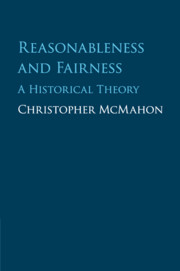1 - Fairness
from Part I - The Substance of Reciprocal Concern
Published online by Cambridge University Press: 24 November 2016
Summary
I have distinguished the morality of reciprocal concern from the morality of direct concern. I have suggested that the morality of reciprocal concern finds application when what is at issue is the organization of a mutually beneficial arrangement of some sort, and I have said that I will focus on mutually beneficial cooperation. Fairness, reasonableness in the concession sense, and justice are central concepts of the morality of reciprocal concern. In this chapter, I develop an account of the first of these concepts, fairness.
The concept of fairness has received less discussion in the philosophical literature than the concept of justice. John Broome has provided one interpretation. For Broome, fairness consists in the satisfaction of claims in proportion to their strength, where a claim is a particular kind of reason that a good should be distributed to a person. Broome's view has been criticized by Brad Hooker. Hooker begins his discussion by mentioning two other conceptions of fairness. Formal fairness requires that rules be applied impartially and equally to each agent. And “broad” substantive fairness requires that all applicable moral reasons be appropriately accommodated. Hooker takes Broome to have proposed a narrower substantive view.
The interpretation of the concept of fairness that I offer here is also narrow and substantive. We should be clear about what this means. Perhaps the most familiar approach to fairness in the contemporary literature ties the concept to arbitrariness. Thus in What We Owe to Each Other, T. M. Scanlon says that policies that arbitrarily favor one person over others are in that respect unfair. And Jonathan Wolff has examined the place of fairness, which he understands as “the demand that no one should be advantaged or disadvantaged by arbitrary factors,” in egalitarian theories of justice. We can speak here of fairness as nonarbitrariness (or unfairness as arbitrariness).
But when advantage and disadvantage are at issue, arbitrary factors are factors that lack a sound moral justification, and this can obscure an important point about our employment of the concept of fairness. Especially in political contexts, there are situations where it seems to make sense to say that moral considerations of other kinds trump fairness.
- Type
- Chapter
- Information
- Reasonableness and FairnessA Historical Theory, pp. 21 - 60Publisher: Cambridge University PressPrint publication year: 2016



